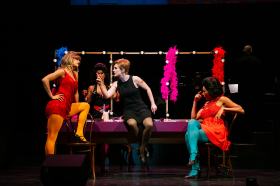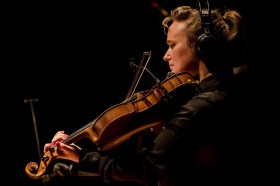Hard on the heels of Opera Australia announcing an alarmingly narrow and conservative program for 2014, it comes as a relief to see a grass roots company willing to be much more enterprising. Lyric Opera of Melbourne’s production of Gluck’s Iphigénie en Tauride provides an opportunity to see an opera that is rarely performed in Australia. Given that the opera was extremely popular in its day and is a wonderful vehicle for showcasing vocal and dramatic excellence, its neglect is puzzling. A string of recent performances overseas, such as those starring Susan Graham as Iphigénie and Placido Domingo as Orestes, are further indications of its appeal to contemporary audiences.
Full credit then must be given to Lyric Opera for mounting this work despite their meagre financial resources. What this production might have lacked by way of lavish staging and orchestral forces had to be counter-balanced by the enthusiasm, imagination and hard work of a talented team.
The drama began as the audience entered along a passage flanked by members of the chorus. A curious, and to my mind inappropriate, choice of popular music blended with the orchestra tuning up. Through a transparent plastic curtain Diana and Iphigénie could be viewed, as if through a window, repeating ritualistic gestures: Diana pacing at the front of the stage and Iphigénie wielding a knife at an altar placed at the back. Further ritualistic elements were emphasised in the stylised arm movement of the vocal ensemble. Simple costumes and props, several making effective use of various forms of plastic, blended echoes of ancient Greece with a more modern aesthetic.
Gluck’s opera is blessedly free of multiple dance movements and the action quickly moves from a calm introduction to a dramatic storm scene. Although the orchestra was initially a little tentative, the storm scene, where Orestes and his companion Pylades are washed up onto the beach of Tauris, was most effective. The vigorous contribution of the 12 members of the orchestra was complemented by swirling dark figures. Thunder and lightening added to the excitement. In fact, Nate Gilkes’ direction generally favoured the active rather than the static without becoming overly busy and distracting.
Rob Sowinski’s simple set design, with a square platform encircling the orchestra, usually served the action well but did pose some problems when the singers were on the downstage side facing away from the conductor. This sometimes led to a straying of focus on the part of the singers and a lack of coordination with orchestra and conductor. Nevertheless, Pat Miller managed to keep instrumentalists and singers together reasonably well for the most part.
Caroline Vercoe gave a spirited and emotionally charged performance as Iphigénie, Agamemnon’s intended sacrificial victim, who had been saved by Diana and ended up as a priestess on the island of Tauris. Her strong mezzo was sometimes uneven in tone and legato line, but there were moments of considerable beauty. Particularly affecting was her anguish as she was faced with killing the person she felt drawn to but did not yet recognise as being her brother. Their final reconciliation had real emotional impact. As Orestes, Michael Lampard’s vibrant baritone made a strong impression. He was vocally secure and was generally successful in conveying Orestes’ despairing guilt at having avenged his father’s death by matricide. As he becomes more comfortable in the role, he will be able to immerse himself more fully in the drama and give a more nuanced performance. His is certainly a most promising talent.
As the bloodthirsty Scythian leader, demanding that all strangers be put to death, Bruce Raggatt made an impressive villain. With his firm voice and assertive stage presence he established a strong dramatic element from the beginning. Less vocally secure was Paul Biencourt as Pylades. Although he gave a fairly convincing characterisation of a friend happy to give his life for a noble cause, on this occasion he had trouble maintaining the vocal stamina needed for this demanding tenor role.
While not all were totally focussed performers, the seven female members of the vocal ensemble sang very well indeed. The four male members were more enthusiastic than refined, but put in a sterling effort. Doubtless their work will become more polished as the season progresses.
Aiming to support young and mid career singers by providing opportunities to hone their operatic skills in suitable repertoire that is seldom performed, Lyric Opera is a company that deserves strong community support. If the reaction of Sunday afternoon’s appreciative audience was any indication, they will certainly have it.
Rating: 3 ½ stars out of 5
Iphigénie
Lyric Opera
With Paul Biencourt, Caroline Vercoe, Michael Lampard, Bruce Raggatt, Angela Hogan and the Lyric Opera Ensemble and Orchestra
Conductor – Pat Miller
Iphigénie en Tauride by Christophe Willibald Gluck
Chapel off Chapel, Prahran
1 – 7 September






